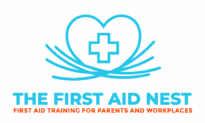First Aid For Seizures

First Aid For a Seizure
There are many different types of seizures and this is one emergency situation that you will cover in workplace first aid courses.
My son had a seizure at home a few days ago. It doesn’t matter who you are or what you do for a living, this will never stop being a very unpleasant experience.
So we thought we might throw a positive spin on it (as he is absolutely fine now!) and use it as a teaching tool!
Some seizures need more investigation than others.
A seizure can look vastly different depending on the type, and we will explain that here.
First Aid For Seizures?
- Protect them from injury by moving any objects and putting some padding around them.
- Time the seizure. It’s helpful for a Dr to know how long it was.
- Check for medical identification e.g. a medical alert necklace or bracelet.
- Stay with the person and give reassurance.
- If the person is having convulsions, do not try to stop them from moving, and do not put anything in their mouth.
- Once the seizure finishes, roll the person onto their side into the recovery position.
- Call an ambulance (unless you have a previously discussed action plan).
If the seizure happens in a wheelchair, car seat, or stroller
Leave the child/person seated if they are secure and safely strapped in.
If they are having convulsions, gently hold their head. When the jerking stops, if they are unconscious, take them out of the seat, lay them down and roll them onto their side.
When to call an ambulance
It is not necessary to call an ambulance every time a seizure occurs in a person who has epilepsy. Most people who have epilepsy will recover from their seizure without any problems after a few minutes.
You should call an ambulance if:
- you think it is the person’s first seizure
- the seizure lasts more than five minutes
- another seizure quickly follows the first one
- the person remains unconscious or has trouble breathing after the seizure
- the seizure happens in water
- the person is hurt or injured
- person has diabetes
- the person does not seem to fully recover.
- you are about to give medications (e.g. diazepam or midazolam) to stop the seizure unless your doctor has told you otherwise.
For further reading, you can visit Health Direct for more on first aid for seizures.
Key points to remember
- If a seizure lasts more than five minutes, or you think it is the person’s first seizure, call an ambulance and follow your workplace first aid training.
- Anyone looking after a child who has a seizure disorder needs to know what to do to make sure the child is safe.
- Move things away so the person does not hurt themselves, and do not put anything in their mouth.
I hope that’s been helpful for you today! Do you need your first aid certificate updated? Head on over to our services page today!
Head on over to our post about frequently asked questions is a first aid course.
Our Baby First Aid Courses
Our baby first aid courses are available in person in your home and online. We run classes in your home with groups of 2, 4 or up to 10 in Sydney & Melbourne and you can book in 3 easy steps!
- Pick your class
- Follow the prompts to purchase
- We will contact you within 24 hours to lock in your date of choice
Our First Aid Certificate Courses
We run most of the popular first aid courses Australia wide. HLTAID011 Provide First Aid, HLTAID009 Provide CPR, HLTAID012 Provide First Aid in an Education & Care Setting, RAMOAP (anaphylaxis), Mental Health first aid and CPR/LVR to name a few.
Book your public spot online or contact us if you have a group of 5+ people for onsite training.
Here are some other resources you may enjoy!
FREE GUIDE: Your Virtual Baby First Aid Kit
FREE GUIDE: Introducing Common Allergy Foods & Allergic Reactions
FREE Workplace Emergency Preparedness Plan: Grab this at the bottom of every page!
Follow for baby & child first aid and allergy info and tips on Instagram, TikTok & Facebook all @thenestcpr
